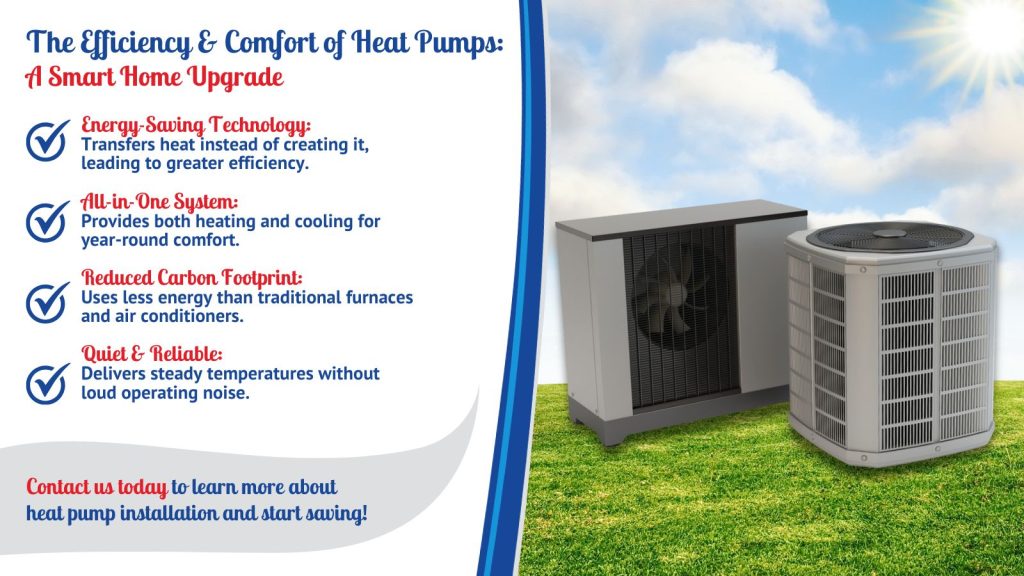If you are looking to reduce energy costs related to heating and cooling your home while still maintaining year-round comfort, a heat pump is the way to go. These innovative systems are an increasingly popular choice for whole-home heating and cooling within a single system.
A heat pump in San Ramon uses significantly less energy compared to more traditional HVAC systems like standalone ACs and heaters. But what is it that makes a heat pump so efficient, and how can you get even more benefits with a dual fuel option? Keep reading to explore the many benefits of installing a heat pump and how you can save money while boosting home comfort.
Why are heat pumps so efficient, and how should I maintain them for long-term performance?
- Heat pumps transfer heat rather than generate it, delivering up to 300% or more efficiency, since for every unit of electricity used, they move three or more units of heat.
- They provide year-round comfort with one system that heats in winter and cools in summer, simplifying maintenance.
- To maintain these benefits:
- Replace or clean the air filter every 1-3 months to sustain optimal airflow and efficiency.
- Keep the outdoor unit clear of debris, snow, and vegetation to prevent airflow blockages.
- Schedule a professional inspection and tune-up annually (ideally before heating or cooling seasons) to check refrigerant levels, electrical controls, and overall system health.

Why Heat Pumps Use Less Energy Than Traditional Systems
Heat pumps are highly efficient because they don’t have to generate heat using a pilot light or burners; instead, they transfer heat from one place to another. Unlike a furnace, which burns fuel or uses electricity to heat up burners to create warmth, heat pumps absorb heat from the air or ground and move it into your home during the colder months.
In the summer, the process reverses and your heat pump works in much the same way as a central air conditioner, by removing heat from your home to keep it cool. The refrigerant cycles through the lines to absorb heat from indoors and then transfers it outside to lower the temperature. This method requires far less energy than conventional systems–especially for heating–and leads to lower utility costs and a smaller carbon footprint.
Heat pump technology is always expanding and changing. Modern heat pumps being installed today can reach efficiency ratings of 300% or even higher. This means that some heat pumps can produce more heating and cooling energy than they are consuming for operation. If you’re in the market for a new system, it’s helpful to review some expert tips when purchasing a heat pump.
Extra Perks: Comfort, Air Quality & More
The benefits don’t end at efficiency – although that’s arguably the best benefit of all. Heat pumps also offer benefits including:
- Year-round comfort – A heat pump is a single system that provides both heating and cooling, eliminating the need for separate AC and furnace units. You only have one unit to maintain and care for with year-round results. Learn more about how this versatility pays off—especially when paired with solar energy.
- Eco-friendly operation – Having a heat pump that is highly energy efficient means that you’re reducing carbon emissions and leaving behind a smaller carbon footprint.
- Consistent temperature control – The highly effective operation means that your home will maintain a more consistent temperature over the course of a day. You’ll be less likely to experience fluctuations to the indoor air temperature as the weather outside changes.
- Quiet operation – Modern heat pumps operate quietly so there won’t be any loud noise – even just loud airflow – that interrupts your day.
- Easy maintenance – There are maintenance steps that your heat pump needs on a regular basis – including twice annual professional maintenance. But overall, there is less maintenance needed compared to systems like gas furnaces that require more maintenance steps.
How Dual-Fuel Heat Pumps Work
While heat pumps are incredibly efficient, the overall heating performance can decline when the temperatures outside dip down to be extremely cold. A dual-fuel system gives you an added heating boost when you need it the most. You get the best out of a heat pump while also enjoying some extra heat without your heat pump overworking. When efficiency matters, understanding how heat pump repairs differ from AC repairs can help you better maintain performance throughout the year.
Take Advantage of Heat Pump Incentives
Here in California, investing in a heat pump is more affordable than ever – and all thanks to Tech Clean California rebates and federal tax credits. You can combine the two together to save as much as $5,100 on an energy-efficient heat pump installation.
It’s time to schedule maintenance with the experts at Comfy Heating & Air Conditioning Inc.

